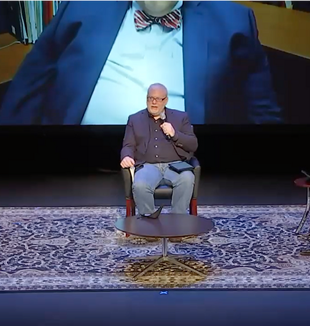
New York Encounter, Day 1: The Relevance of the Stars
How does one capture the life and legacy of Msgr. Lorenzo Albacete in a concise enough platform to introduce him to those who never met him while being personal enough for those that did know him to go deeper? The impact of this priest, theologian, and former rocket scientist, a spiritual father to many in the Communion and Liberation movement, in the wider Church and even nonbelievers, was the topic of the second event of the New York Encounter, “The Relevance of the Stars.” Msgr. Albacete’s life was full of profound encounters, and the event initiated just that - an encounter with this brilliant but simple man through those whose lives were changed by him.
This panel discussion featured three friends of the late monsignor: Stephen Sanchez, the President of The Albacete Forum (an organization dedicated to the legacy of Msgr. Albacete’s life and writings), and Lisa Lickona and Greg Wolfe, editors of the recently released collection of some of these writings, entitled The Relevance of the Stars. While the discussion predominately served as an introduction to the book, it also offered an introduction to the man behind it.
In discussing the process of how the book came together, Wolfe shared a sense of tongue-in-cheek annoyance at the disorganization in which Msgr. Albacete left his writings, but also admiration for his gift of presence. “He was someone who really went from moment to moment. . . . He wouldn’t work on polishing every draft or worry about collecting these things for publication. He had a marvelous freedom to be present in the moment and not worry about legacy. That’s what we need to do,” he said.
While many who knew him recall his sly humor and his charming personality, Wolfe emphasized that we would be amiss to overlook Albacete's intellectual brilliance and remarkable ability to communicate weighty theological concepts in an accessible way. “Lorenzo Albacete was a gift to us because he came at just the right historic moment to synthesize the thought of three figures who had such a huge impact at the end twentieth century—Luigi Giussani, the founder of Communion and Liberation, John Paul II, and Benedict XVI,” said Wolfe. “And these essays really are beautifully intuitive of these great thinkers, and able to kind of channel them and contextualize them in ways that make their thought much less formidable than approaching them in the form of a big heavy book by Ratzinger.”
But what was evident throughout the presentation was that his most distinctive trait, that which drew so many into his friendship, was his fascination with the Mystery. “He had a way of looking at things that was deeply and profoundly Christian, moved by his encounter with [Jesus],” said Sanchez. Lickona shared a parable, beloved by Msgr. Albacete and included in the book, of an ant that leaves the line, climbs a tree and sees the stars for the first time. “Monsignor. . . was someone with a total awareness of this ‘something other' breaking in. And that’s really what we’re looking for. We don’t want to remain on this worldly level, we want to let something else enter in. We want the stars to enter in,” she said.
How is this book by a deceased monsignor relevant to the situation we are living today? This question circled the discussion throughout. “Living through this pandemic, living through all of the experiences of it, the voice I kept wishing I could hear was his,” said Sanchez. “Monsignor had a way of cutting through a lot of the rhetoric, a lot of the ideology. . . and getting to the heart of what was really at stake for us, and also doing it with a little bit of humor. Monsignor had become, especially at the end of his life, a father. . . and I was missing that.”
Quoting Msgr. Albacete on the Charlie Rose Show after Pope John Paul II’s death saying, “He’s not gone to me,” Lickona stated simply, “Monsignor’s not gone to me. I feel him very much present. That’s part of what we’re invited into, is this greater communion.”
The panel event also served as an introduction to one of two Encounter virtual exhibits—“The Albacete Show,” a film by John Touhey (who also moderated the discussion) on the life and legacy of Msgr. Albacete. The film includes personal interviews with those who knew him, mixed with letters and video footage, and punctuated by cheeky, Monty Python-esque style transitions offering a gentle roasting of the subject. Watching “The Albacete Show” feels like being at a family reunion where everyone is trading stories about a beloved relative. And, somehow, that friend is still here.